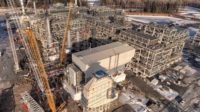More than two and a half years after Bechtel National and Sempra Energy signed a fixed-price engineering, procurement and construction contract for the Port Arthur liquefied natural gas liquefaction project in Texas, the two companies now say they have “restated” the contract and updated the project price to $10.5 billion.
The companies signed the original agreement in March 2020, but Sempra delayed a final investment decision to build the plant by at least a year due to COVID-19 generated cuts in global demand for fuel.
Neither Sempra nor Bechtel disclosed or commented on the original contract price but earlier reports suggested the 2020 cost at between $8 billion and $9 billion.
Based on current robust customer interest, “we know that Port Arthur LNG is highly attractive to the global market,” Sempra said in its Oct.20 announcement of the contract.
The Federal Energy Regulatory Commission on Oct. 13 approved Sempra’s July request for an extension to complete construction of the plant and associated pipelines, citing market conditions and supply chain problems related to the pandemic for construction delays. The deadline was moved to June 2028 from April 2024. FERC originally approved building the plant in April 2019.
Th global demand for LNG has rebounded in 2022 with natural gas prices in Europe up about 111% after Russia’s invasion of Ukraine.
Phase one of the project will include two natural gas liquefaction trains expected to produce 13.5 million tons per year of LNG, storage tanks, a marine berth and loading facilities. The project’s second phase is “competitively positioned” and under development, Sempra said.
Expansion Possible
But the large site, nearly 3,000 acres along a three-mile stretch of the Sabine-Neches waterway, could be expanded to eight liquefaction trains with capacity of about 45 million tons per year, Sempra said.
Bechtel's oil, gas and chemicals unit will perform detailed engineering, procurement, construction, commissioning, startup, performance testing and operator training activities.
Sempra said Bechtel will continue engineering before a final investment decision to better assure project cost and schedule certainty.
Global gas buyers have been slow to sign new long-term contracts needed to finance multibillion-dollar LNG projects due to overbuilding of export terminals in 2019, says Reuters. Building new U.S. export infrastructure now is seen as critical to providing overseas markets with cleaner fuel alternatives, said Jeffrey Martin, Sempra Energy chairman and CEO.
The project could create a craft workforce that peaks at about 5,000, Sempra said.
But the Port Arthur Community Action Network, which has sought stricter air pollution limits for the facility that a state environmental agency declined to set in September in approving its permit—despite support of the group's position by an administrative law judge earlier this year—filed an appeal in federal court in October, says a report by Spotlight.
It says the state agency agreed with Port Arthur LNG's claims that those limits would be not be financially feasible and that new technologies have not been tested in existing facilities. Agency and company officials declined comment, citing the new lawsuit.
Another Big LNG Project
Sempra also is developing, with partners, Phase 2 of the Cameron LNG export project in Hackberry, La. by adding a fourth train with a production capacity of 6.75 million tpy in an agreement reached in April. Developer partners include TotalEnergies, Mitsubishi and NKY Group,
Two front-end engineering design contracts were awarded to Bechtel and to a joint venture JGC America and Zachry Industrial. At the end of the contracts, one firm will be selected as EPC contractor for the estimated $4-billion project. Construction is set to begin in 2026.
The developers in May also agreed to develop a carbon capture and storage project for Cameron LNG, with a capacity of up to 2 million tons stored in underground injection wells. The project is subject to securing permits and definitive agreements, as well as a final investment decision by each partner.
Sempra announced earlier this year a planned $36-billion capital investment program for the next five years, a record level, including both fossil fuel and renewable energy spending.







Post a comment to this article
Report Abusive Comment